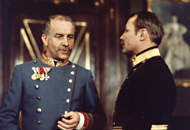Hofmansthal and Astheticism
The part most interesting to me in Hofmansthal's "Tale of the 672nd Night," is when The Merchant's Son ventures out of his home and encounters the child in the greenhouse. He begins by describing this childing with ghostly and haunting detail, a way in which most people would not initially respond to a child innocently peering through glass. Even more interesting, however is how the Merchant's Son describes this child's expression as full of, "terrifying rage" and "full of contempt." The protagonist's judgement here, I think says far more about him than it does about this child. I think that choosing this encounter to be with a young child was intentional and powerful for three reasons. One, it highlights the obssurdity of the main character. Two, it also draws attention to the fact that the Merchant's Son is so preoccupied with his paranoia that he even suspects a child that he has never met before of judging and hating him. Finally, I think he finds it reminisient of his own childhood. To have a child that he views as highly judgemental and angry staring back at him, evokes the image of himself as a child. Whether or not the child was actually like this is unimportant, but it does show us more about the main character-- especially when he pays the child off to leave him alone. Paying the child off exemplifies the Merchant's Son's theory in life, weath is for the purpose of buying things, buying things accumulates beauty, surrounding oneself with beauty creates saftey and happiness expelling all hate and judgment.



2 comments:
I think you are definitely on to something here. I think that Hoffmannstal did pick the child for a reason as well, also notice that the child was dressed in white, a color of innocence. The descriptions of this person that the merchant's son could not change through his mind, the fact that she was a child and wearing white are all signs of innocence. While the descriptions of the child through the merchant's son's eyes are this completely non innocent, almost devilish description.
I really like this part of the story. I believe that the discrepancies between the description of the child and how the merchant's son describes her show how the merchant's son is completely disconnected with the world in which he lives. I think you are completely right about him paying the child off, and I believe this further emphasizes the merchant's son's disconnect with the world. But what I believe is important is that in the tail end of the story he seems to be actually trying to be friendly and in essence achieve unity or friendship with the other "souls" around him.
Post a Comment